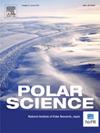Collaboration between Arctic and northern subnational governments disrupted by the Russian invasion of Ukraine
IF 1.5
4区 地球科学
Q3 ECOLOGY
引用次数: 0
Abstract
Subnational governments have gradually been integrated into Arctic governance structures, and new cross-border collaboration emerged during the late 2010s despite the annexation of Crimea. However, the Russian invasion of Ukraine in February 2022 and the ensuing war greatly disrupted multilateral collaboration between subnational authorities. In addition to war-related challenges, long-term problems, such as a weak shared identity, vague objectives, and difficulties in establishing suitable working mechanisms continue to exist. The international turbulence has severely affected the activities of the Northern Forum and led to the end of Barents regional collaboration and suspension of the Bering/Pacific-Arctic Council initiative (BPAC). Meanwhile, the Arctic Mayors’ Forum has strengthened its position as a key regional stakeholder, and a new Arctic Urban–Regional Cooperation Program has been launched. While this suggests that municipalities may be replacing regions as the most prominent subnational drivers of cross-border collaboration, their policy areas remain unclear. The institutional frameworks supporting collaboration among Arctic and northern subnational governments have not proved more flexible than those established by states. Moreover, subnational authorities have not challenged their respective central governments by deviating from national policies.
北极和北方地方政府之间的合作因俄罗斯入侵乌克兰而中断
地方政府已逐渐融入北极治理结构,尽管克里米亚被吞并,但2010年代末出现了新的跨境合作。然而,俄罗斯在2022年2月入侵乌克兰以及随后的战争极大地破坏了地方当局之间的多边合作。除了与战争有关的挑战外,诸如共同身份薄弱、目标模糊以及难以建立适当的工作机制等长期问题仍然存在。国际局势动荡严重影响了北方论坛的各项活动,导致巴伦支地区合作终止,白令海/太平洋-北极理事会倡议暂停。与此同时,北极市长论坛加强了其作为关键区域利益攸关方的地位,并启动了新的北极城市-区域合作计划。虽然这表明,市政当局可能正在取代地区,成为推动跨境合作的最重要的地方政府,但它们的政策领域仍不明朗。事实证明,支持北极和北方地方政府之间合作的体制框架并不比国家建立的体制框架更灵活。此外,地方政府并没有通过偏离国家政策来挑战各自的中央政府。
本文章由计算机程序翻译,如有差异,请以英文原文为准。
求助全文
约1分钟内获得全文
求助全文
来源期刊

Polar Science
ECOLOGY-GEOSCIENCES, MULTIDISCIPLINARY
CiteScore
3.90
自引率
5.60%
发文量
46
期刊介绍:
Polar Science is an international, peer-reviewed quarterly journal. It is dedicated to publishing original research articles for sciences relating to the polar regions of the Earth and other planets. Polar Science aims to cover 15 disciplines which are listed below; they cover most aspects of physical sciences, geosciences and life sciences, together with engineering and social sciences. Articles should attract the interest of broad polar science communities, and not be limited to the interests of those who work under specific research subjects. Polar Science also has an Open Archive whereby published articles are made freely available from ScienceDirect after an embargo period of 24 months from the date of publication.
- Space and upper atmosphere physics
- Atmospheric science/climatology
- Glaciology
- Oceanography/sea ice studies
- Geology/petrology
- Solid earth geophysics/seismology
- Marine Earth science
- Geomorphology/Cenozoic-Quaternary geology
- Meteoritics
- Terrestrial biology
- Marine biology
- Animal ecology
- Environment
- Polar Engineering
- Humanities and social sciences.
 求助内容:
求助内容: 应助结果提醒方式:
应助结果提醒方式:


